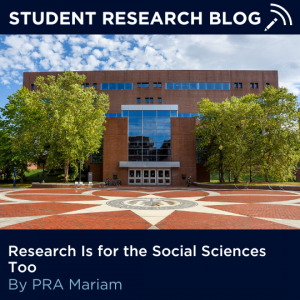By Mariam Vargas, Peer Research Ambassador
 When people think about research, they often picture scientists in lab coats conducting experiments in high-tech labs. I’ve lost count of how many times STEM majors have told me they were surprised I was doing research. But here’s the thing—the “science” in Political Science is not just a placeholder. Research isn’t confined to the natural sciences; it’s just as vital in the social sciences. At its core, research in the social sciences helps us understand human behavior, society, and the systems that govern our lives. This work doesn’t require microscopes or petri dishes. It demands curiosity, critical thinking, and a drive to uncover the “why” behind the way our world works.
When people think about research, they often picture scientists in lab coats conducting experiments in high-tech labs. I’ve lost count of how many times STEM majors have told me they were surprised I was doing research. But here’s the thing—the “science” in Political Science is not just a placeholder. Research isn’t confined to the natural sciences; it’s just as vital in the social sciences. At its core, research in the social sciences helps us understand human behavior, society, and the systems that govern our lives. This work doesn’t require microscopes or petri dishes. It demands curiosity, critical thinking, and a drive to uncover the “why” behind the way our world works.
In the social sciences, research begins with a question. What factors drive political stability or instability in different countries? How do international norms influence state behavior in the global arena? What explains voter turnout patterns in key elections? These questions guide investigations that have the potential to inform policies, strengthen diplomatic efforts, and promote global justice. Social science research is everywhere. When you see predictions for voter turnout in an upcoming election, assessments of human rights compliance, or analyses of peace agreements, you’re seeing the power of social science research in action.
Social science researchers draw from a diverse set of tools. Qualitative methods like interviews and ethnography provide deep, narrative insights, while quantitative methods like surveys and statistical analysis offer measurable data. These tools allow researchers to tackle questions from multiple angles, ensuring their findings are robust and reflective of real-world complexity. Political scientists, for example, study everything from electoral systems to international treaties. They analyze voting trends, track the impacts of policies, and explore the dynamics of conflict and peacebuilding. Their work doesn’t just live in academic journals—it informs debates, shapes legislation, and guides diplomacy.
As a Political Science and International Relations double major with a Human Rights minor, I’ve had the privilege of exploring a wide range of topics through social science research. One of my most impactful projects involved the CIRIGHTS Human Rights Data Project, where I monitored how well countries meet their international human rights obligations. This research sheds light on global accountability and helps advocate for stronger protections against violations. Currently, I am researching for the Department of Homeland Security, focusing on coding both qualitative and quantitative data to study recruitment patterns in rebel groups—work that helps us understand the factors leading to instability and conflict. Other projects have included exploring maternal organizations in Latin America that formed in response to state-led and state-sponsored violence. I’ve also analyzed Latino voter turnout in U.S. presidential elections. By studying various factors that influence voter behavior, I aim to uncover how cultural, economic, and political forces shape electoral outcomes—a vital endeavor in a democracy where every vote matters.
What ties these projects together is their potential to create meaningful change. From understanding conflict and human rights to empowering underrepresented voters, social science research connects the dots between data and action. The beauty of social science research is that anyone can do it—even STEM majors. Whether you’re analyzing historical documents, collecting survey responses, or coding data like I have, every step contributes to a broader understanding of the human experience. Research isn’t just for academics—it’s for activists, policymakers, community organizers, and anyone passionate about change. So, if you’ve ever thought research wasn’t for you, think again, research is for the social sciences too.
Mariam is a senior double majoring in Political Science and IMJR: International Relations and minoring in Human Rights. Click here to learn more about Mariam.